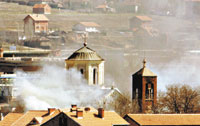|
The recent violence in Kosovo
was not unexpected by those who monitor the situation and had
discerned the gathering storm clouds. Those on the contrary
who were completely absorbed with developments in Iraq and
the fight against international terrorism, thought that the
problems in the Balkans had been more or less resolved.
|

|
The resurgence
of violence was unavoidable in Kosovo, a country with unclear legal
status, ravaged by the bombardments, under UN administration since
1999, lacking strong democratic institutions, plagued by criminal
networks trafficking in women, guns and drugs, and comprising two
communities -Albanians and Serbs- divided by implacable hatred.
Killings,
burned churches, burned mosques: the events of recent months have forced
us to review, seriously and comprehensively, what is happening in our
neighbourhood. In Serbia, Prime Minister Zoran Djindjic, who was regarded
as pro-Western, was assassinated in March 2003. In the elections of
December people who have been accused of war crimes were re-elected
to Parliament. In Croatia, the electorate restored to power the same
nationalist party of which the leadership had undertaken the ethnic
cleansing in Bosnia ten years back. A similar grey picture in Bosnia-Herzegovina.
The Dayton Agreement did put a stop to the killings in 1995, but led
to a weak government, two deeply divided communities, three nationalities,
ten cantons in one half of the country, and three armies. There is
talk of an "Albanian Question" in the Balkans.
Very quickly,
it has become apparent that building peace and democracy is much harder
than starting a war. This worrying situation in the Balkans led some
of us, a month ago, to initiate new discussions -in the context of
a forum including a photography exhibition on the subject of the Mostar
bridge- about peace, reconciliation, and the European prospects of
the Balkan peninsula.
"I
am a Bosnian and a Moslem. I do not hate anyone". So said Haris
Siladjic, former Prime Minister of Bosnia (1993-96), upon signing the
Olympic Truce in Zappion, Athens. At least 150,000 men, women and children
were killed in the war in Yugoslavia. More than two million former
Yugoslavs were driven out of their homes by other former Yugoslavs.
In this former country, the terrible sight of burned-out, plundered,
devastated villages has become commonplace. Out of this complex mosaic
of national, linguistic, religious, historical and political divisions,
newspapers and TV reports focus on a few obvious images: mutilated
bodies, old women crying, abandoned mosques, churches and towns in
rubble. In reality, you'd need a book to explain each single piece
of the story.
There
is no doubt that the future of the Balkan nations will depend on the
resolution of the terrible problems created by the war. Europe can
not be peaceful and secure when violence, national hatred, and conflict
exist within its borders. Greece has supported unconditionally the
European orientation of the Balkan peninsula. The European Council
at Thesaloniki (June 2003) declared that "it is ready to fully
and effectively support the European prospects of the West Balkan countries,
which will become an integral part of the Union as soon as they fulfil
the criteria".
In other
words, the Balkan countries are called upon to establish functional,
durable democracies. This requires the creation of new social bonds
and the advancement of dialogue and citizen participation to create
societies sharing a common vision and respecting personal and social
rights, the equality of the sexes, the principles of law and order,
the rights of minorities, and national, religious, or sexual diversity.
|

|
The developments
in the Balkans affect the vital interests of our country. PASOK
has rendered Greece and active geopolitical player and a factor
in favour of peace in the region. We shall have to wait and see
whether New Democracy will follow the course set by Simitis and
Papandreou.
* MEP, www.karamanou.gr
Newspaper ELEFTHEROTYPIA-
23/03/2004
|


